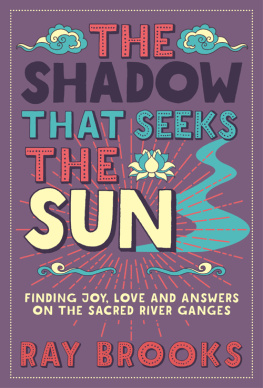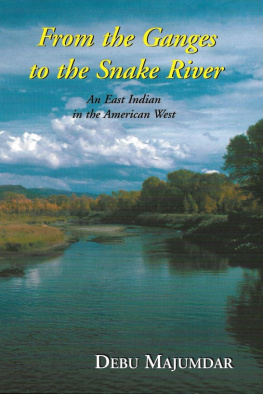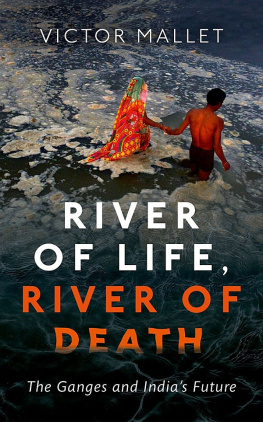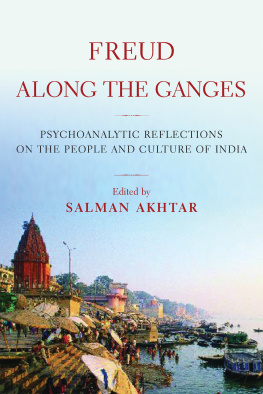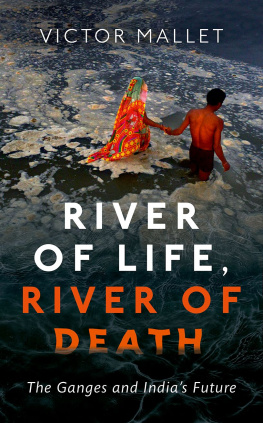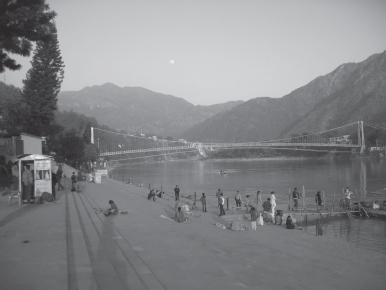THE SHADOW
THAT SEEKS
THE SUN
ALSO BY RAY BROOKS
Blowing Zen: Finding an Authentic Life
First published by H J Kramer /
New World Library, San Francisco, CA., USA, 2000
German edition, Ich ging den Weg der Zen-Flte,
Ansata Verlag, Germany, 2000
Blowing Zen, republished, revised and expanded
edition, Sentient Publications, Boulder, CO., USA, 2011
THE SHADOW
THAT SEEKS
THE SUN
FINDING LOVE, JOY AND ANSWERS ON THE
SACRED RIVER GANGES
RAY BROOKS
Dedicated to
Rudra,
Usha Devi &
Jiddu Krishnamurti
Dianne Brooks, co-writer
The Shadow That Seeks the Sun
CONTENTS
ACKNOWLEDGMENTS
I would like to acknowledge and express my sincere thanks to the Hall of Mirrors group Facebook. Their unique approach at pointing to this that is, facilitated in the maturing of my understanding. Also, my gratitude to J. Krishnamurti, Arvind Pare, Swami Dayananda, Jnaneshwar, Rupert Spira, Francis Lucille. The influences of all the aforementioned helped me shape and sharpen my ability to reproduce the talks with Rudra in a coherent and understandable way for the reader. I would like to offer my heartfelt thanks to Dianne Brooks for her recollections and contribution as co-writer and frontline editor. Luci Yamamoto, for her expertise and professionalism in editing and shaping the manuscript. Ron McGeary, for his unfailing support and technical contribution. Tellwell Talent, Inc, for their professionalism and cooperation. To our friends for their help, support and encouragement: Ray Shahan, Alan Neachell, Kaan Mertol, Debra Johnson, Siddhartha Krishna, Sara Daly, Chris Lea, Gill Shrank, Timothy Conway, Rajesh Dwivedi, Ambika Shah Chhabra, Madhur Chhabra and Sandy Neyle. Special thanks go to Gerard Barrie for introducing us to The Culturium blog and thus to Paula Marvelly, who introduced us to Michael Mann. To Michael Mann, formerly the Commissioning Editor at Watkins Publishing, London we thank you for loving the book and wanting to publish it. Our appreciation and thanks to the Watkins Publishing team and to Managing Editor Slav Todorov and Victoria Godden, Assistant Editor, for working closely with us on the copy-editing and the layout of the finished product. Title inspired by Rupert Spira.
Links of interest at www.raybrooks.org
This is a small section of the Muni Ki Reti ghats on the banks of the River Ganges in Rishikesh, Uttarakhand, India. Ghats is a recurring word used throughout the book and describes a series of steps leading down to a river, particularly a holy river that is used for ritual bathing. In the distance is Ram Jhula, a suspension bridge.
CHAPTER ONE
Yogis and Bhogis
Rishikesh, 2007
I am God. Give me one hundred rupees!
An ash-smeared sadhu stood in front of me, his brass pot thrust under my nose.
You must be kidding, baba.
Yes, sir, he said, wobbling his head, I am not kidding.
With a dismissive flick of my hand, I stepped out of his way and walked on.
Fifty rupees, sir!
I kept walking.
Ten rupees! God yelled his final offer.
The fruit seller, delighted with the show, called after me: One rupee days are over, sir.
The local street vendors in Rishikesh call men like God money babas or bhogis. They claim that they are not true holy men, just beggars or even criminals on the run. With so many foreigners visiting this small pilgrimage town, it has become a very lucrative area for babas who like to prey on the naivet of spiritual tourists. If you spent any time on the ghats, its easy to identify true sadhus by the way they conduct themselves. True sadhus live by the will of God, never beg, and accept money or food only if it is offered. They tend to stay away from the busy tourist areas during the day, preferring to spend their time in contemplation and meditation. And those renunciates who live in the forest will come down to the river before sunrise to perform their pj rituals. You would never see a bhogi taking a holy dip in the Ganga at 4 a.m.
As the clock tower at Parmarth Ashram solemnly struck nine, the morning sun was burning off the last of the river mist. Hundreds of cormorants sat on the boulders in the shallow part of the river and more were landing. As the birds settled, they spread their wings and warmed their bodies.
Another ashram decided it was nine oclock and manually banged out an irregular beat. In the distance, I could hear more bells counting out the time. There wasnt a clock in India that was right.
The Monkey Punky Gang, as Dianne has named a small group of the local children, trotted towards me grinning playfully and chattering away with one another. They wore woolen hats that looked like tea cozies, ill-fitting sweaters full of holes, long ragged skirts and baggy trousers that covered their skinny legs. Some wore flip-flops; others, plastic shoes two sizes too big. There would be no school for them today. Today, and most days, they were the flower sellers responsible for the small flower bowls that people floated down the river as offerings to Mother Ganga.
Sachin! they screamed when they spotted me and rushed over to see if I had anything for them.
Flaaawar Sachin?
No flower, I said.
Please, Sachin, they begged, jostling one another for my business.
The secret to a peaceful life on the ghats, especially if staying a long time, is to avoid buying offerings from the children. If you bought from one, you had to buy from all. I often saw Westerners realizing their dream of meditating on the banks of the sacred Ganga, only to be swamped by children who insisted that they buy an offering. Unless you were firm and told them to clear off, they would never leave you alone.
One of the children spotted the ferry coming. The gang waved goodbye and dashed off to terrorize the passengers.
Good morning!
I looked in the direction of the greeting and recognized a man Id met on the ferry the previous day. He was on the early morning crossing, and the small boat that went between Muni Ki Reti and Swag Ashram was just pulling out. Hed seen me running to the dock and had called out to the helmsman, who, in turn, yelled to me to wait as he maneuvered the boat back to the rickety jetty. With an outstretched arm the ticket collector managed to grab my hand as I jumped across the rapidly widening gap between dry land and the boat. The passengers commented on my safe landing, and I thanked the crew for letting me on board. Id just spent weeks searching for a flute teacher who could show me some of the classical India raga on my shakuhachi, and was grateful I wouldnt be late for my first lesson.
Among the few people making the short journey, most were wrapped in ragged cloth and blankets, hunched against the cold wind blowing down from the Himalayas. The man who had shouted for the boat to stop was sitting across from me, and he acknowledged my thanks with a nod and a smile. He was distinguished-looking and conspicuously free of the religious paraphernalia so ubiquitous around here. I guessed that he must be of Anglo-Indian descent because of his light skin and unusual blue eyes. He was remarkably well dressed and I couldnt help but admire his style. He wore a well-cut, collarless navy-blue jacket the type made popular by Indias post-independence Prime Minister Jawaharlal Nehru in the late 1940s and a beautifully made burgundy pashmina scarf. Despite his silver-grey hair, it was hard to say how old he was sixty, perhaps, or a well-preserved seventy.
Next page
